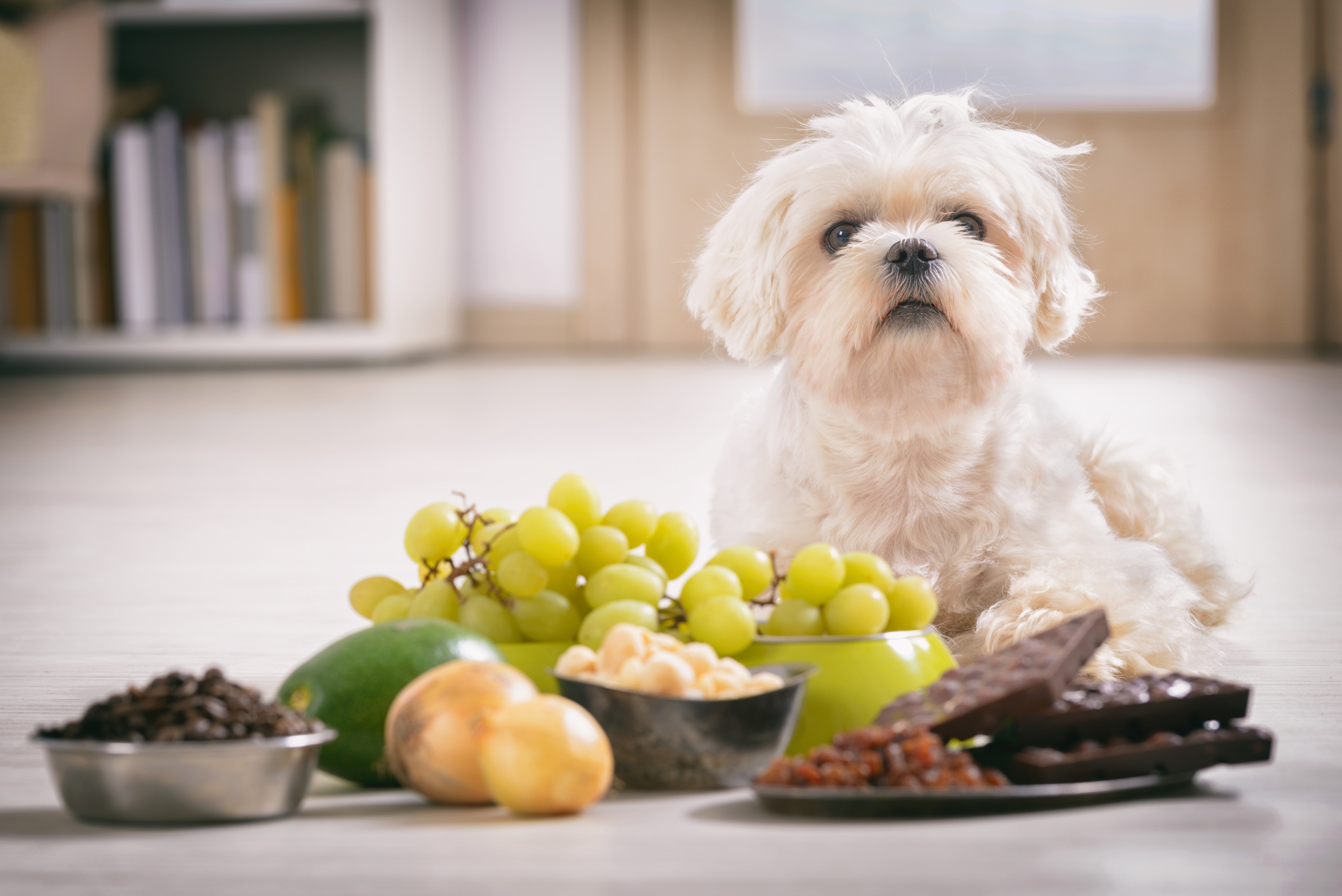People Foods Pets Should Avoid

To many of us, nothing says “I love you” like a home cooked meal or a special treat. And most of us like to share our love with our pets in the same way – by giving the gift of food.
But there are many people foods to avoid in pets – some you may not be aware of. And whether you love to cook for your dog or cat, or you have a toddler who throws food on the floor to your eagerly awaiting pet, awareness of what’s okay to give and what’s not is the first step in preventing a pet emergency.
Poisonous To Pets: Preventing an Emergency
According to the ASPCA Animal Poison Control Center, people food is the third most common thing that causes toxicity in pets (after human prescription and over the counter medications). Pets simply can’t ingest the same things that humans can.
If your pet eats something that it shouldn’t, call us right away or, if after hours, take your pet to the nearest emergency hospital. Pet toxins can act quickly, and so should you. Often, the outcome for your pet depends upon how quickly we start treatment, in addition to how much of the toxin your pet ate and when. It’s helpful to bring the wrapper or container the food came in to help us determine the best course of action for your pet.
People Foods to Avoid
It’s easy to think of food safety more readily around the holidays, when all those delicious family meals are at the forefront of our minds. But in reality, food safety for pets is important all year round. Here are our top things to watch for in your home.
Chocolate – contains two chemical toxins: caffeine, and theobromine. Both cause vomiting and diarrhea, panting, trembling, abnormal heart rhythm, hyperactivity, excessive thirst and urination, seizures and even death.
Xylitol – found in some sugar free gum, candy, toothpaste, peanut butter and over 700 other common human foods and personal care products, xylitol is extremely toxic to dogs and cats. It causes vomiting, weakness, trembling, collapse, and death resulting from liver failure.
Alcohol – under no circumstances should your pet be given alcohol. It causes vomiting, diarrhea, central nervous system depression, difficulty breathing, abnormal blood acidity, coma, and death.
Raisins and grapes – for unknown reasons, these two items have been shown to cause acute kidney failure.
Macadamia nuts – these can cause vomiting, diarrhea, tremors, hyperthermia, and weakness in dogs.
Onions, chives, and garlic – these vegetables and herbs from the allum family can cause GI irritation and possible red blood cell damage. Cats are the more susceptible species but dogs could also be affected if enough is eaten.
Stone fruit pits (e.g. cherry, plum, apricot, peach) – the stems, leaves and seeds (pits) of stone fruits contain cyanogenic glycosides, which are toxic to pets. Signs include brick red mucous membranes, dilated pupils, difficulty breathing, panting, and shock.
Salt and salty snack foods – salt ingestion in pets can cause excessive thirst and urination and possible sodium ion poisoning. Symptoms may include vomiting, diarrhea, depression, tremors, elevated body temperature, seizures, and even death.
Hops – with home brewing of beer becoming more common, hops toxicity is being seen more often in emergency clinics. Signs include malignant hyperthermia, increased breathing, racing heart rate, anxiety, vomiting, abnormal blood clotting, and even death.
Yeasted bread dough – unbaked yeasted dough can continue to rise in the warm, moist environment of the stomach, and cause GI obstruction, life-threatening bloat, unproductive vomiting, lethargy, weakness, elevated heart rate, collapse, and shock.
Treatment of Pet Poisoning
Treatment will depend upon what and how much of the toxic food your pet ingested. In some cases, inducing vomiting may prove successful if treatment is begun within 30 minutes of ingesting the food (before it leaves the stomach).
However, some emergency signs of pet toxicity don’t show up right away. If treatment is delayed, it can and should include any number of things.
Some common treatment includes:
- Hospitalization with 24 hour monitoring
- IV fluids
- IV medications
- Hourly blood monitoring
- Blood transfusions
Hopefully you have a good understanding of foods to avoid in pets. If you’re worried that your pet has eaten something it shouldn’t, please don’t hesitate to contact us. And, as always, your team at Harpeth Hills Animal Hospital is ready and eager to help.

